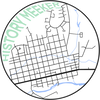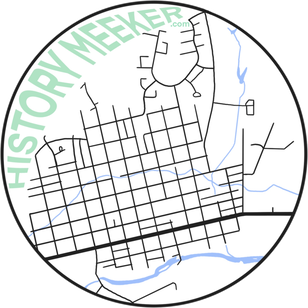Here you can find some of the essential pieces in time that have impacted Meeker, and shaped it to the town it is today. Even before it's founding in 1885, the history of Meeker has been rich, and something everyone can be interested in. Below you can find information on the founding, Meeker massacre, the first businesses, churches, schools, what the government was like, and more.
Founding:
|
* This account of the Meeker Incident is just one of many, and some details could be slightly off compared to the true story.
|
The town of Meeker was founded in 1885. It was named Meeker because it was the last resting place of the infamous Nathan C. Meeker. Meeker had moved from Ohio to Greeley, Colorado and then became employed as an Indian Agent in the Spring of 1878. As a result of the Treaty of 1868, most indigenous tribes across the nation were assigned an agent to watch over them and teach them to be "civilized" , He was a strong Christian who believed that he was a great leader of men and could bring anyone to his way of thinking. He was a prolific writer and was very knowledgable about agriculture.
He had previously lived in Greeley, Colorado where he and Horace Greeley had worked together to develop a utopian community and lifestyle. Their project had not been as productive as either had hoped and Mr. Greeley became ill and passed away leaving Meeker without a job. Meeker sought after a position as an Indian Agent. When Meeker arrived in the valley, the Agency was in the valley of what is now County Rd #8, It is marked. Meeker did not find that location to his liking. The Utes, being nomadic, had traveled away from that location to what is now Powell Park for better hunting and grazing. As the "People of the Horse" grazing was essential to their lives. The Utes had experienced the broken promises and falsehoods of the white government for 10 years when Meeker arrived as their new agent. and wanted nothing to do with him. They had been living in the White River Valley for thousands of years, following their own traditions and religious beliefs. They wanted to keep to themselves, in the same way their ancestors had. Pressured by his religious beliefs and the expectations placed on him as part of his position as agent, Meeker was insistent that the Utes become "civilized"' and Christian creating tension between them. The relationship was exacerbated when promised rations from the government were not forthcoming and Meeker refused the Utes wishes of going off to hunt and fish to feed their families. Meeker felt that horse racing was gambling, thus a sin, so he asked his plowman to plow the Utes race track, A shot was fired toward the plowman who ceased to plow. Meeker was confronted by Chief Johnson. He retorted that the Utes should kill all their horse to grow crops which resulted in an physical altercation. Meeker sent work to Ft. Steele, Wyoming that he needed protection. This led to the Milk Creek Battle and the Meeker Incident, sometimes known as the Meeker Massacre, The battle caused the death of 10 men and Nathan Meeker as well as 14 Utes. Women and children were taken but were unharmed. The site of the battle is commemorated today. During the 4th of July, a play about this event is put on. Through the tragic beginning of Meeker, pride and courage is shown, as is seen in the town today. |
First Businesses:
|
Pictures of a few of the first businesses
|
The Meeker Herald:
The local newspaper, The Meeker Herald started by James Lyttle, was one of the first businesses in town. It informed the citizens of any news coming or going every week on Saturday. From marriages to who was visiting Meeker that week, every citizen was up to date on the local news. The Rio Blanco Herald Times still stands, and recently moved back into the building it was originally in. See what the Rio Blanco Herald is like today, here, or take a look at what the building is like here! The Hugus Store: Known as the earliest business in Meeker, the Hugus store was built in 1879. This was a big chain department store, eventually getting up to 12 stores. The Meeker store moved to many different locations and had many different associates. Eventually having two buildings established just for the business. This building still stands and has many businesses in it. Take a look at what the building looked like compared to how it looks today here! 1887 Stores: In 1887, the town was very new. Despite this, we still had many stores. In all, these are the stores we had:
In the photo to the left you can see Meeker's Main Street a few years after it's founding. You can see how many of the businesses are in barracks as well as the new Meeker Hotel in the back. Many of the first businesses were started in barracks because there were already buildings and there wasn't a need/supplies to build all new buildings. It also helped use these buildings for something because otherwise the buildings would have been useless and eventually be torn down. Some of these barracks still stand and the White River Museum is still held in old military barracks. You can explore more about the museum here and see what the barracks are like today!
|
First Churches:
|
Above is a slideshow of the first church buildings to stand in Meeker. Most are still standing and holding church.
|
The first church that Meeker ever had was before it even became a town. In 1885 the St. James Episcopal church held the first formal church service. The building that held the Episcopal church was built in 1889. This building still stands and holds the St. James Episcopal Church in Meeker. The United Methodist Church in Meeker formed soon after in 1892. This was held in the old school house in Powell Park. A building for the church was built in 1911 on Park Street and the church is still held there in a renovated building! Today Meeker has 19 churches and religious organizations. Explore what some of these building look like today here, and learn more about the first churches and their history here! |
Schools:
|
Coal Creek:
The Coal Creek school was established in 1884. It was a small, one classroom school outside of Meeker. The building was made in 1892, and has since been recognized as a historical preservation in Meeker and at the state level as well. Grade School: Back when Meeker was still part of Garfield County, a vote was caste in 1883. This decided that Meeker would have a school board and school was held in different places. After 5 years of this, another vote was caste that said Meeker should have a school building. Eventually, almost 20 years later, the school became unsafe for students, and many more buildings were built after. Learn more in depth about some of the first school here as well as what the schools are like now! |
First Ranches:
|
|
Ever since the founding of Meeker, ranching and agriculture have been a very big part of the economy and culture. In the slideshow to the left, you can see a few pictures of the first ranches in and around Meeker. Some of these ranches are still in Meeker and operating today. Here is a list of some of the first ranches in or near Meeker:
|
Government:
|
At the beginning of Meeker, the town was part of Garfield County. Until 1889, when they left to become their own county. (To later be joined by Rangely Colorado in 1947.) With this came a new government and laws.
In the beginning, Meeker was a majorly democratic town, changing over to a republican town during the civil rights movement. It has stayed as a fairly Republican town to this day, joined by most of Western Colorado. |
Early entertainment:
|
Above is a slideshow showing some activities the citizens of Meeker did to keep themselves entertained. From 1898 to mid 1900's.
|
Much like today, when Meeker was founded the town was very big into sports and rodeo's. Many of the kids around kept themselves entertained by participating in sports against local towns, riding in the parade floats, playing little games like jump rope, and riding horses. The community also came together a lot to put on rodeo's and picnics to encourage the citizens to get out and get involved in the town. Meeker has always had a very alive and thriving community around it. Meeker also usually had a carnival or circus that kept many entertained during the 4th of July, as well as a parade and many other fun activities. This tradition has carried on to today with Meeker's famous range call happening during the 4th. |






